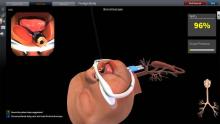
Major Complications of Airway Management in the UK (NAP4)
VIEW THE NAP4 POWERPOINT PRESENTATION
During every operation and admission to intensive care, it is vital to ensure that the patient can breathe through a ‘clear airway’. Multiple options for achieving this are available. While these procedures are routinely performed and are usually very safe, we know that important complications occasionally occur. NHS litigation authority (NHSLA) data indicates that such events certainly do occur, but their frequency and consequences are unclear. It is likely that several patients die or suffer serious brain damage each year. The Royal College of Anaesthetists has undertaken to try to enumerate this problem as its 4th National Audit Project. This sets out to determine the number of major complications arising from airway management during anaesthesia and the number of these procedures performed per year. As similar events also occur during care in the emergency department and intensive care the project will capture these events too.
Reports of such events are often incomplete and the subject remains controversial even within the profession. This makes learning from such events difficult. Gaining a more accurate idea of the incidence of these complications will allow anaesthetists (and those involved in emergency airway management) to make better risk : benefit assessments in patient care and allow more robust disclosure of risk to patients. As well as learning how often such events occur, by studying the cohort of complications that we detect we hope to gain insight into the causes of the problems, clarify best practice and improve patient safety in England, Scotland, Northern Ireland and Wales.
The project process has been approved by the National Research Ethics Service and by the Department of Health (Patient Information advisory Group). It is being performed in partnership with the Difficult Airway Society (DAS) and is partly funded by DAS and the National Patient Safety Agency. It is endorsed and supported by the Association of Paediatric Anaesthetists, Obstetric Anaesthetists Association, Association of Anaesthetists of Great Britain and Ireland, Intensive Care Society, Intensive Care National Audit and Research Centre, College of Emergency Physicians, College of Operating Department Practitioners, Association for Peri-operative Practice, Chief Medical officers and Medical Defences organisations.
We hope to receive reports from anaesthetists, intensivists, emergency physicians, ODPs/ anaesthesia nurses, and surgeons and are contacting the professional bodies/associations of all these groups to seek their support with this project. Further cases may be identified by contact with NHSLA and NPSA.
We are interested in the complications of airway management in NHS hospitals and the main focus will remain anaesthesia. However we intend to include adults and children and will examine airway events arising during treatment by anaesthetists, emergency physicians and intensive care doctors.
This project is ONLY designed to collect data on major complications of airway management.
- Death.
- Brain damage.
- Emergency surgical airway or needle cricothroidotomy
- Unanticipated ICU admission: only where the complications of airway management are the cause of admission or lead to an adverse outcome.
Therefore we do not wish to be informed of the following:
- Cases admitted to HDU
- Cases which would have been admitted to ICU even without airway management difficulty, unless the airway management difficulty resulted in significant adverse outcome.
- Difficult airway management, no matter how difficult, without adverse patient outcome (we do wish to collect all cases of emergency surgical airway/needle cricothyroidotomy)
An example of how the system might work is as follows. An intensivist sees a patient with cerebral hypoxia following intubation difficulties during anaesthesia. The intensivist simply notifies us by email that a case has occurred (minimum data: date, hospital where event occurred, name and location of informant). The email is received at the project centre and the Local Reporter of the hospital is contacted. The local reporter then submits a full incident report. This report is directed to the Difficult Airway Society, who are developing a secure web-reporting site for this purpose. The data will be validated and fully anonymised. When data collection is complete the link with the original notification will be destroyed. The identified cases, fully anonymised and summarised, will then be reviewed by a small assessment group. The College and the review group will have no details of who or where a report came from.
We will start the project in September 2008 and complete it 12 months later. The project will be reported in 2010 including both quantitative analysis and an analysis of cases identified. We will feed this information back to all those who have assisted in the project.
For us this is an important investigation. At present we genuinely do not know the incidence of these major complications. This makes communication of risk to patients difficult or impossible. It also makes it difficult to balance risk and benefit for individual patients very difficult. We would greatly appreciate endorsement of this project and help in gaining the support of your colleagues/members.
If you have any enquiries about this project please contact Joint Audit Leads:
Dr Tim Cook
Co-Audit Lead, 4th National Audit Project (NAP4)
email: [email protected] »
Dr Nick Woodall
Co-Audit Lead, 4th National Audit Project (NAP4)
email: [email protected] »
